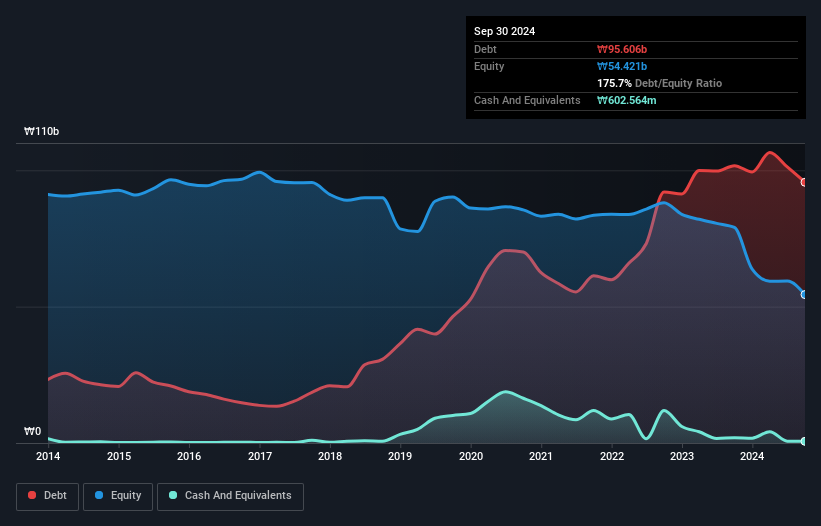Legendary fund manager Li Lu (who Charlie Munger backed) once said, 'The biggest investment risk is not the volatility of prices, but whether you will suffer a permanent loss of capital.' When we think about how risky a company is, we always like to look at its use of debt, since debt overload can lead to ruin. We note that Union Materials Corp. (KRX:047400) does have debt on its balance sheet. But is this debt a concern to shareholders?
When Is Debt A Problem?
Generally speaking, debt only becomes a real problem when a company can't easily pay it off, either by raising capital or with its own cash flow. If things get really bad, the lenders can take control of the business. While that is not too common, we often do see indebted companies permanently diluting shareholders because lenders force them to raise capital at a distressed price. Of course, the upside of debt is that it often represents cheap capital, especially when it replaces dilution in a company with the ability to reinvest at high rates of return. When we examine debt levels, we first consider both cash and debt levels, together.
See our latest analysis for Union Materials
What Is Union Materials's Net Debt?
You can click the graphic below for the historical numbers, but it shows that Union Materials had ₩95.6b of debt in September 2024, down from ₩101.7b, one year before. Net debt is about the same, since the it doesn't have much cash.

A Look At Union Materials' Liabilities
According to the last reported balance sheet, Union Materials had liabilities of ₩96.5b due within 12 months, and liabilities of ₩22.5b due beyond 12 months. Offsetting these obligations, it had cash of ₩602.6m as well as receivables valued at ₩38.8b due within 12 months. So it has liabilities totalling ₩79.6b more than its cash and near-term receivables, combined.
This deficit is considerable relative to its market capitalization of ₩86.7b, so it does suggest shareholders should keep an eye on Union Materials' use of debt. This suggests shareholders would be heavily diluted if the company needed to shore up its balance sheet in a hurry. When analysing debt levels, the balance sheet is the obvious place to start. But it is Union Materials's earnings that will influence how the balance sheet holds up in the future. So when considering debt, it's definitely worth looking at the earnings trend. Click here for an interactive snapshot.
In the last year Union Materials had a loss before interest and tax, and actually shrunk its revenue by 8.1%, to ₩110b. That's not what we would hope to see.
Caveat Emptor
Over the last twelve months Union Materials produced an earnings before interest and tax (EBIT) loss. Its EBIT loss was a whopping ₩9.8b. When we look at that and recall the liabilities on its balance sheet, relative to cash, it seems unwise to us for the company to have any debt. So we think its balance sheet is a little strained, though not beyond repair. For example, we would not want to see a repeat of last year's loss of ₩23b. In the meantime, we consider the stock very risky. There's no doubt that we learn most about debt from the balance sheet. But ultimately, every company can contain risks that exist outside of the balance sheet. Be aware that Union Materials is showing 2 warning signs in our investment analysis , and 1 of those shouldn't be ignored...
When all is said and done, sometimes its easier to focus on companies that don't even need debt. Readers can access a list of growth stocks with zero net debt 100% free, right now.
New: AI Stock Screener & Alerts
Our new AI Stock Screener scans the market every day to uncover opportunities.
• Dividend Powerhouses (3%+ Yield)
• Undervalued Small Caps with Insider Buying
• High growth Tech and AI Companies
Or build your own from over 50 metrics.
Have feedback on this article? Concerned about the content? Get in touch with us directly. Alternatively, email editorial-team (at) simplywallst.com.
This article by Simply Wall St is general in nature. We provide commentary based on historical data and analyst forecasts only using an unbiased methodology and our articles are not intended to be financial advice. It does not constitute a recommendation to buy or sell any stock, and does not take account of your objectives, or your financial situation. We aim to bring you long-term focused analysis driven by fundamental data. Note that our analysis may not factor in the latest price-sensitive company announcements or qualitative material. Simply Wall St has no position in any stocks mentioned.
About KOSE:A047400
Union Materials
Manufactures and sells ferrite magnets for motors in South Korea and internationally.
Mediocre balance sheet with low risk.
Market Insights
Weekly Picks

THE KINGDOM OF BROWN GOODS: WHY MGPI IS BEING CRUSHED BY INVENTORY & PRIMED FOR RESURRECTION


Why Vertical Aerospace (NYSE: EVTL) is Worth Possibly Over 13x its Current Price


The Quiet Giant That Became AI’s Power Grid
Recently Updated Narratives


Mastersystem Infotama will achieve 18.9% revenue growth as fair value hits IDR1,650


Insiders Sell, Investors Watch: What’s Going On at PG?

Waiting for the Inevitable
Popular Narratives


MicroVision will explode future revenue by 380.37% with a vision towards success


NVDA: Expanding AI Demand Will Drive Major Data Center Investments Through 2026


Crazy Undervalued 42 Baggers Silver Play (Active & Running Mine)
Trending Discussion




